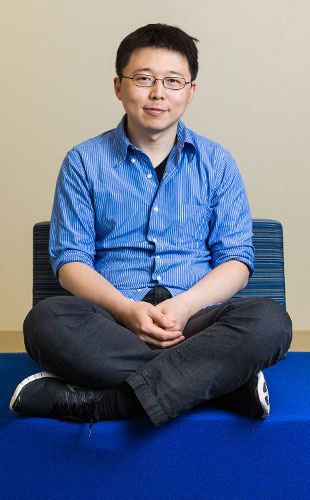 © PORTER GIFFORDAs a teen in Iowa, Feng Zhang spent five hours every weekday after school volunteering in a lab at the Human Gene Therapy Research Institute in Des Moines. Zhang remembers fondly the “crazy ideas” his mentor would come up with, like whether green fluorescent protein (GFP) could act as sunscreen (it absorbs UV light). Zhang purified GFP, slathered it onto a layer of DNA, and found that it did, in fact, prevent DNA damage.
© PORTER GIFFORDAs a teen in Iowa, Feng Zhang spent five hours every weekday after school volunteering in a lab at the Human Gene Therapy Research Institute in Des Moines. Zhang remembers fondly the “crazy ideas” his mentor would come up with, like whether green fluorescent protein (GFP) could act as sunscreen (it absorbs UV light). Zhang purified GFP, slathered it onto a layer of DNA, and found that it did, in fact, prevent DNA damage.
Zhang’s project earned the first of many science fair top prizes, winnings that later helped pay his tuition at Harvard University. But despite his success in molecular biology, Zhang opted to major in chemistry and physics. “I wanted to get a solid foundation in areas of science that don’t change as quickly,” Zhang says. “The laws of physics and chemistry are pretty set. Molecular biology is changing every day.”
His undergraduate degree initially hampered him when he joined Stanford University as a graduate student in 2004. Zhang wanted to study the brain, but all the professors he queried turned him down because of his lack of formal neuroscience training. Finally, Karl Deisseroth accepted Zhang for a rotation in his lab, and their partnership yielded one ...
























